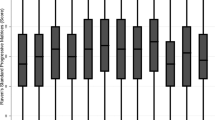Abstract
Objective
To assess non-verbal intelligence and its relationship with nutritional status, nutrient intakes and parents’ education in school-children.
Methods
A cross-sectional, observational study was conducted in children between 6–11 years, without any known chronic disorder or intellectual disability. Data were collected regarding parents’ education, anthropometry and dietary intakes. Non-verbal intelligence was assessed by Raven’s Coloured Progressive Matrices (RCPM).
Results
In 323 enrolled children (52.9% boys), a significant positive association was observed between RCPM scores and parents’ education (father’s rs=0.14, mother’s rs=0.22), height Z-scores (rs=0.14) and dietary intakes of zinc (rs=0.14), iron (rs=0.12) and folate (rs=0.14).
Conclusion
Height in normal range, higher zinc, iron and folate intakes, and parental higher educational levels were associated with higher non-verbal intelligence scores.
Similar content being viewed by others
References
Crookston BT, Forste R, McClellan C, Georgiadis A, Heaton TB. Factors associated with cognitive achievement in late childhood and adolescence: The Young Lives cohort study of children in Ethiopia, India, Peru, and Vietnam. BMC Pediatr. 2014;14:253.
Chowdhury DS, Ghosh T. Nutritional and socioeconomic status in cognitive development of Santal children of Purulia district, India. Ann Hum Biol. 2011;38:188–93.
Government of India. Census of India 2011: Rural Urban distribution of population. Ministry of Home Affairs Government of India. 2011 Available from: http://censusindia.gov.in/2011–prov–results/paper2/data_files/india/Rural_Urban_2011.pdf. Accessed May 20, 2018.
Laxmaiah A, Arlappa N, Balakrishna N, Mallikarjuna Rao K, Galreddy C, Kumar S, et al. Prevalence and determinants of micronutrient deficiencies among rural children of eight states in India. Ann Nutr Metab. 2013;62:231–41.
Raven J. Coloured Progressive Matrices and Crichton Vocabulary Scale India Edition. Bengaluru: NCS Pearson (India) Pvt Ltd; 2004. p. 1–99.
Diagnostic and Statistical Manual of Mental Disorders: DSM–5. 5th ed. Arlington, Virginia, USA: American Psychiatric Association; 2013.
Kumar N, Shekhar C, Kumar P, Kundu A. Kuppuswamy’s socioeconomic status scale–updating for 2007. Indian J Pediatr. 2007;74:1131–2.
Khadilkar V, Yadav S, Agrawal K, Tamboli S, Banerjee M, Cherian A, et al. Revised IAP growth charts for height, weight and body mass index for 5–18–year–old Indian children. Indian Pediatr. 2015;52:47–55.
World Health Organization. Haemoglobin concentrations for the diagnosis of anaemia and assessment of severity. In: Vitamin and Mineral Nutrition Information System. 2011. p. 1–6.
Chiplonkar S. CDiet–Bellycheaters. Available from: https://bellycheaters.com/cdiet/. Accessed October 05, 2018.
Indian Council of Medical Research. Nutrient Requirements and Recommended Dietary Allowances for Indians. ICMR: New Delhi; 2009. p. 1–334.
Sen A, Kanani SJ. Impact of iron–folic acid supplementation on cognitive abilities of school girls in Vadodara. Indian Pediatr. 2009;46:137–43.
Nguyen C, Gracely E, Lee B. Serum folate but not vitamin B–12 concentrations are positively associated with cognitive test scores in children aged 6–16 years. J Nutr. 2013;143:500.
Tupe RP, Chiplonkar SA. Zinc supplementation improved cognitive performance and taste acuity in Indian adolescent girls. J Am Coll Nutr. 2009;28:388–96.
Author information
Authors and Affiliations
Corresponding author
Rights and permissions
About this article
Cite this article
Mandlik, R., Ekbote, V., Chiplonkar, S. et al. Parental Education, Children’s Nutritional Status and Non-verbal Intelligence in Rural School-children. Indian Pediatr 56, 205–208 (2019). https://doi.org/10.1007/s13312-019-1501-y
Received:
Revised:
Accepted:
Published:
Issue Date:
DOI: https://doi.org/10.1007/s13312-019-1501-y




